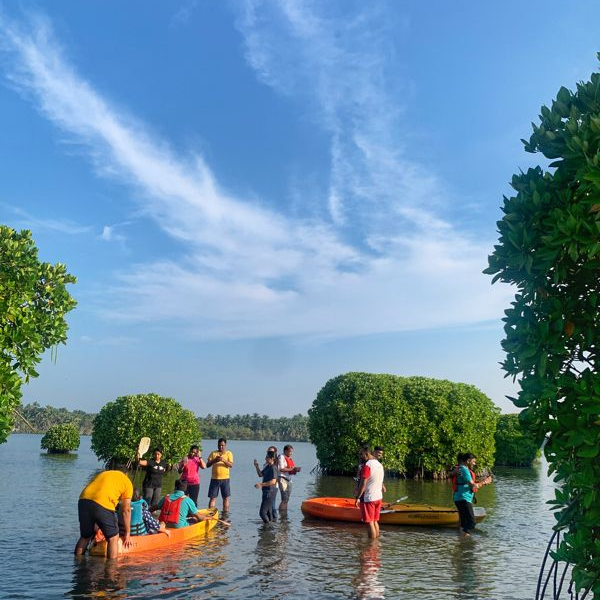Nestled along the pristine coastline of North Kerala, the region of North Malabar is renowned for its breathtaking natural beauty and diverse ecosystems. One of the most captivating attractions in this region is the remarkable mangrove forests that grace its shores.
In this blog post, we will embark on a virtual journey to Poothali Homestay, located in the picturesque district of Kasaragod, to discover the mesmerizing mangroves of North Malabar.
A Haven of Tranquility:
Poothali Homestay, a charming retreat that offers a perfect blend of comfort and serenity, is situated amidst the lush greenery of Neeleshwaram. The homestay serves as an excellent base for exploring the mangrove forests that thrive in the region. The hosts’ warm hospitality and commitment to eco-tourism create a memorable experience for visitors seeking a closer connection with nature.
The Mangroves of North Malabar:
Mangroves are unique coastal ecosystems that consist of salt-tolerant trees and shrubs, thriving in the intertidal zones between land and sea. North Malabar has an extensive network of mangrove forests, teeming with an incredible variety of flora and fauna. The mangroves play a crucial role in maintaining the region’s ecological balance by acting as a buffer against coastal erosion, filtering pollutants, and providing a safe haven for numerous species of marine life.
Exploring the Mangrove Trails:
One of the highlights of a visit to Poothali Homestay is the opportunity to explore the mesmerizing mangrove trails. As you glide silently through the dense mangroves, you’ll witness the trees’ intricate root systems, which serve as nursery grounds for fish, crabs, and other aquatic creatures. Keep your eyes peeled for glimpses of colourful birds perched among the branches, and watch for the playful antics of curious otters.
Poothali Homestay takes pride in its commitment to sustainable tourism and environmental conservation. They strive to minimize the impact on the delicate mangrove ecosystem through responsible practices while raising awareness about its importance. The homestay actively promotes eco-friendly activities such as birdwatching, nature walks, and educational programs on mangrove conservation, offering visitors a chance to contribute to preserving this invaluable natural resource. To read more on the Mangrove forests of North Malabar, click here.
Environmental Challenges Facing Mangroves in North Malabar:
Despite their ecological significance, mangroves in North Malabar face various environmental challenges that threaten their existence.
Here are some of the key issues:
- Habitat Destruction: Urbanization, industrial development, and agricultural expansion pose a significant threat to mangroves. Land reclamation for construction projects, pollution from industries, and conversion of mangrove areas into agricultural fields or aquaculture ponds leads to the destruction and fragmentation of these vital habitats.
- Pollution and Erosion: Pollution from industries, agriculture, and urban runoff, including untreated sewage and chemical contaminants, can adversely affect mangroves. Also, improper waste disposal and oil spills can contaminate the surrounding waters and smother the mangrove roots, hindering their growth. Moreover, unchecked coastal erosion can lead to the loss of mangrove forests, as they act as a natural defence against wave action.
- Climate Change: Rising sea levels, changing weather patterns, and increased frequency of extreme weather events associated with climate change pose a significant threat to mangroves. Sea-level rise can inundate the mangrove forests, leading to their submergence and loss. Changes in rainfall patterns and temperature can also impact mangrove species’ growth and reproductive cycles.
- Overexploitation: Unsustainable harvesting of mangrove resources, such as timber, firewood, and medicinal plants, can have detrimental effects on mangrove ecosystems. Additionally, unregulated fishing practices, including destructive fishing gear, can damage the intricate root systems and disrupt the delicate balance of the mangrove ecosystem.
- Invasive Species: Introducing invasive species, both plant and animal, can harm native mangrove species. Invasive plants can outcompete native mangrove species for resources, while invasive animals can prey upon or disrupt the natural ecological interactions within the mangrove ecosystem.

Addressing the Challenges:
Efforts are being made at various levels to address these challenges and conserve the mangroves of North Malabar. These include:
- Conservation Initiatives: Local communities, environmental organizations, and government agencies actively engage in mangrove conservation initiatives. These efforts include establishing protected areas, restoration projects, and implementing sustainable management practices.
- Awareness and Education: Raising awareness about the importance of mangroves and their conservation is crucial. Educational programs, community outreach, and ecotourism initiatives significantly foster understanding and appreciation for these unique ecosystems.
- Policy and Regulation: Enforcing policies and regulations that protect mangroves from destructive practices is vital. This includes strict enforcement against illegal land conversion, pollution, and unsustainable resource extraction.
- Community Participation: Engaging local communities in mangrove conservation efforts is essential for long-term success. Involving communities in sustainable livelihood initiatives, providing alternative income sources, and encouraging their active participation in mangrove restoration activities contribute to their ownership and commitment to conservation.
Preserving the mangroves of North Malabar requires a collective effort and a comprehensive approach that addresses the environmental challenges they face. By recognizing their importance, promoting sustainable practices, and fostering a sense of stewardship, we can ensure the continued existence of these invaluable ecosystems for future generations.
A visit to the mangroves of North Malabar is an awe-inspiring experience that immerses you in the beauty and tranquillity of nature. Poothali Homestay, situated in the enchanting district of Kasaragod, offers the perfect gateway to explore these remarkable ecosystems.
As you navigate the winding waterways and marvel at the rich biodiversity, you’ll not only forge unforgettable memories but also contribute to preserving these invaluable mangrove forests. Discover the hidden treasures of North Malabar and let the magic of the mangroves leave an indelible mark on your soul. Book your stay at Poothali to enjoy this escape in Nature’s bounty.

